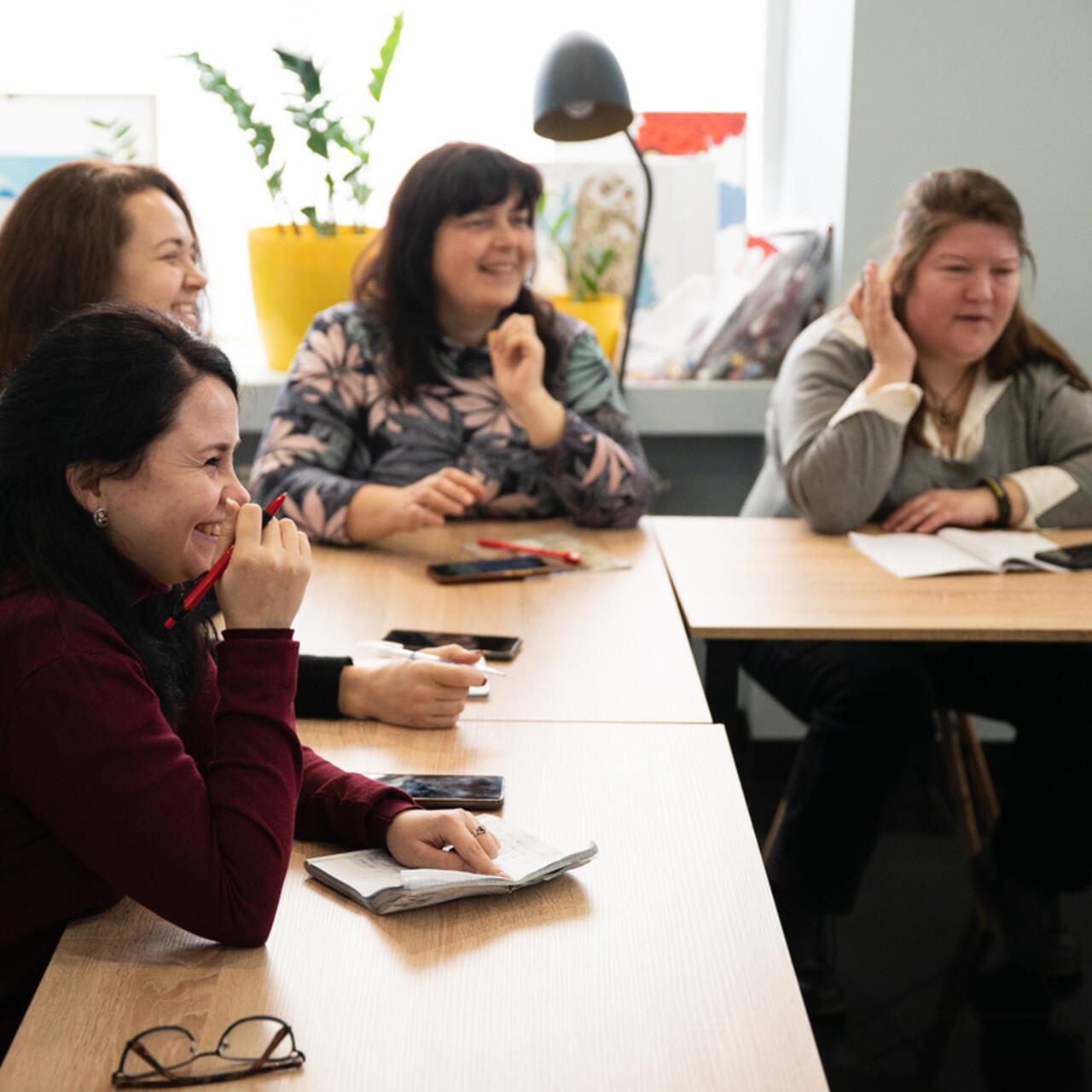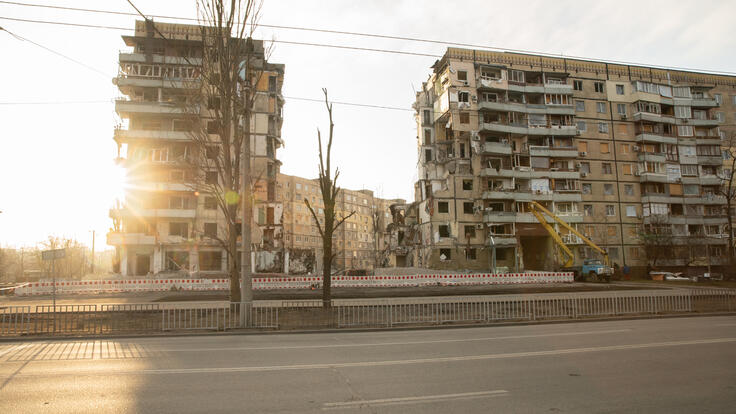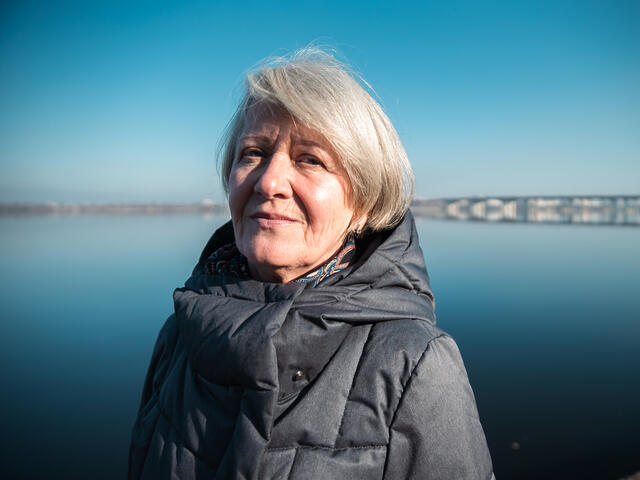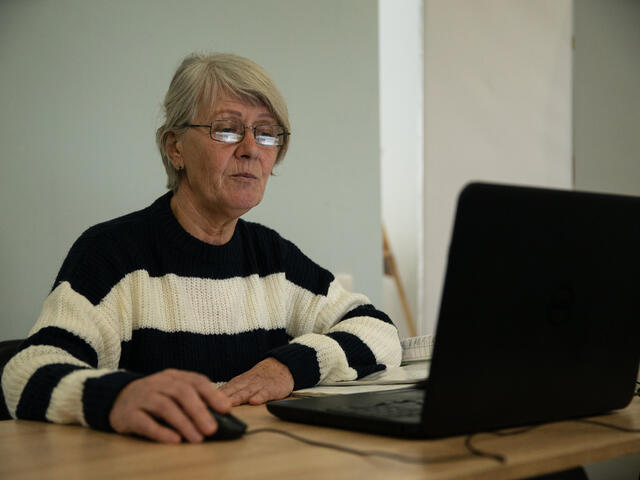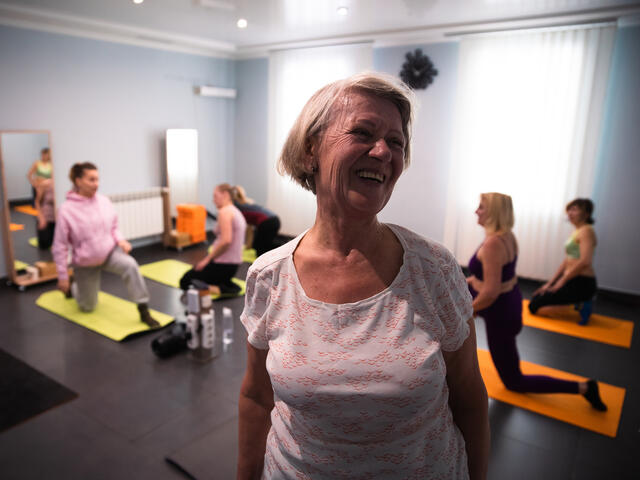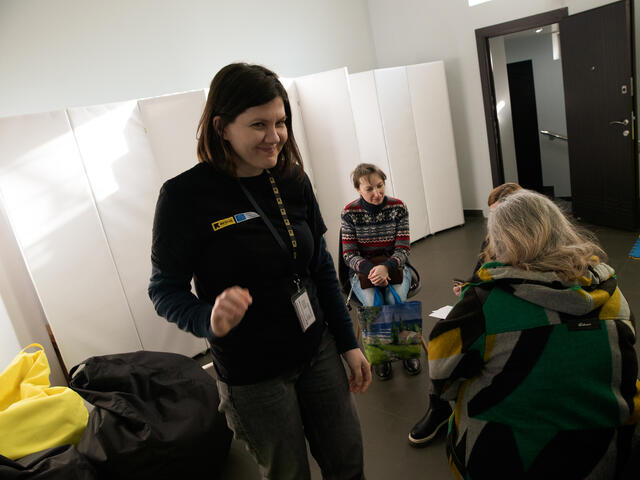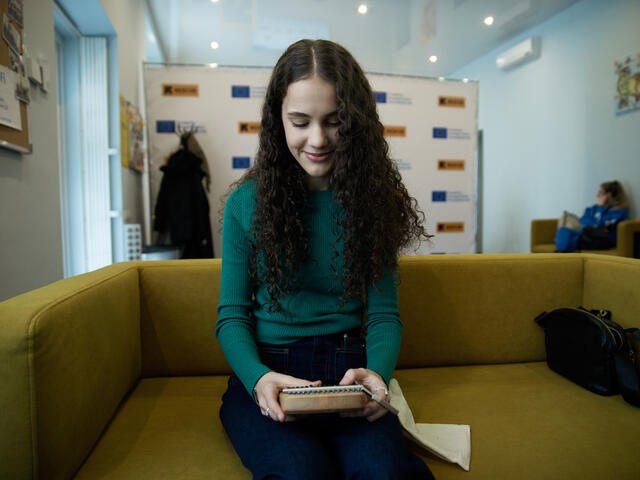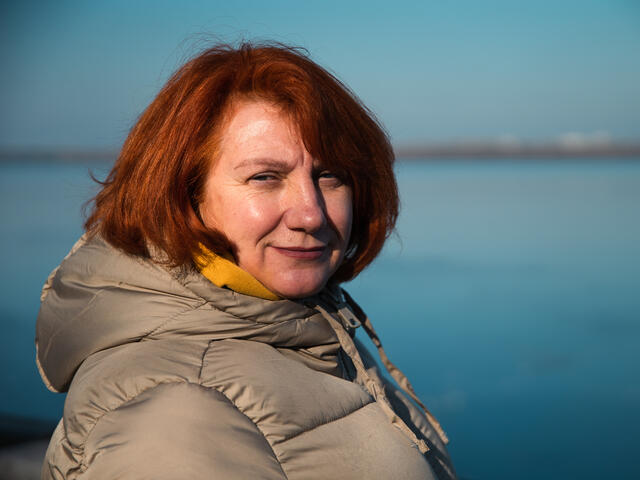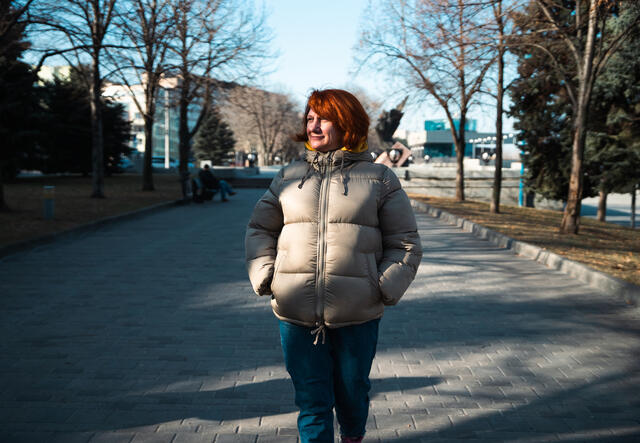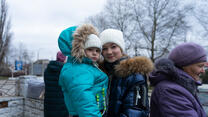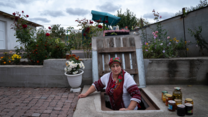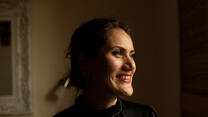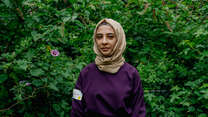Since the escalation of the war in Ukraine, millions of people have been uprooted from their homes. Families have been forced to move across borders or to more secure regions within the country, as their neighborhoods and cities have come under attack.
As one of the country’s largest cities near the front lines, Dnipro has become a humanitarian hub, a medical center and a place of refuge for people fleeing the various hotspots. Though the city and its infrastructure have been heavily damaged by shelling several times, it has remained resilient amidst an ongoing war.
Relatively equidistant from the major battlegrounds, Dnipro has become a logistical hub for humanitarian aid and a reception point for families seeking safety.
Photo: Jack Hewson for the IRC
In Dnipro, the IRC is running a safe space where displaced women and those living in the host community can benefit from a wide range of free activities, including English classes, art therapy, fitness training, yoga, and dance. Supported by the European Union (EU), the IRC women’s center is helping women and girls take a break from the experiences of the war and recreate a sense of the community they’ve lost.
Meet Iryna, Anastasiia, and Oleksandra, three women who’ve made the women’s center a part of their daily lives.
Iryna
Iryna has been grateful to receive legal assistance related to her work as an educator.
Photo: Jack Hewson for IRC
Iryna had been forced to leave her home in Sloviansk once before—in 2014, when heavy fighting erupted in the Donbas region.
In 2022, when the conflict escalated into a war, she decided to stay in Sloviansk to support her godson, his pregnant wife and their child, who had fled fighting in their hometown of Izyum. However, when she took them for a gynecological consultation, they became stranded in the basement of the clinic as air-raid sirens blared for three hours. They realized then that it was time for them to evacuate.
As an educator, Iryna was evacuated along with her colleagues at the Sloviansk Chemical and Mechanical Technical College. After she became more settled in Dnipro, her colleague told her about the IRC women’s center and the support it provides to displaced women and girls.
At the center, Iryna has been grateful to receive legal assistance related to her work as an educator. The war had created issues around awarding diplomas and producing other documents for her students, and IRC staff were there to help. “[The IRC legal staff] assisted me greatly,” she says. “They not only offered their consultancy services, they also provided help with the documentation.”
For educators in Ukraine, the frequent blackouts have made online teaching a challenge. Iryna is grateful that she can host her lessons from the IRC women's center.
Photo: Jack Hewson for the IRC
The center has also provided Iryna with a reliable space to teach lessons to her college students. Because of the widespread damage to Ukraine’s power grids, Iryna had been experiencing poor internet connection and no light while teaching her students online, and she needed an alternative solution.
She shares: “I went to the girls from the IRC women’s center and asked, ‘I had exams that I couldn’t miss. Could I host the classes there?’ The girls kindly said ‘yes,’ and I conducted the lessons. The next time I looked at the noticeboard at the center, an invitation had arrived. ‘If you like, we have these days free when you can come and host your lessons here with us.’”
As the war in Ukraine continues, Iryna has found a positive outlet in the center's yoga classes. She feels inspired by her yoga teacher and is practicing living in the present moment.
Iryna takes a yoga class women's center.
Photo: Diana Zeyneb Alhindawi for the IRC
“Irrespective of my age, it is always possible to find something in life," she says. "You mustn’t live in what has already been. You have to live for the here and now.”
Anastasiia
Anastasiia, IRC women's protection officer, welcomes clients to the Teenage Camp.
Photo: Jack Hewson for IRC
The idea for Teenage Camp, an EU-funded program for teenage girls affected by the war, started with the moms at the IRC women’s center.
“The idea to create such a girls’ camp, so full of activities, came to us when we began to receive feedback from some mothers that their girls were feeling extremely lonely,” says Anastasiia, a senior women’s protection officer with the IRC.
“Long months of COVID, plus restrictions on attending school during the armed conflict, imposed their negative effects. The girls lost much during this time.”
Anastasiia and her team created the initiative so that teenage girls from various social backgrounds and places of residence could come together and find support in one another. Through Teenage Camp, they could take classes in English, art therapy, dance, and yoga, or just relax together at the center.
“I have a lot of friends who have moved away, and I don’t have so many people to converse with. [When I saw] the space for women and girls, I liked the idea that I could come along on my day off, communicate with someone, and hear something interesting for myself,” says Lera, a 14-year-old who participated in Teenage Camp.
Photo: Jack Hewson for the IRC
What stood out most to Anastasiia was the girls’ eagerness to learn and participate in the workshops they provided, whether it was speaking with a gynecologist about women’s health or diving into a discussion about gender issues.
“We ran a class in gender education, and we were amazed at the extent to which the girls were open to this topic,” she says. “They knew a lot about what a stereotype is, about gender inequality, about gender discrimination against women, and they advanced real examples from their own lives when they had come up against inequality and discrimination.”
Anastasiia and her team have also supervised learning activities like “To Be a Woman,” a role-modelling game where the girls could play out positive and negative life situations that women face and learn helpful ways to react to them.
Anastasiia feels fulfilled seeing the bonds created between the adolescent girls who participate in Teenage Camp. She is delighted that after the camp, they have gone to the cinema together or met up for tea – and have continued on as a community outside of the center.
Oleksandra
Oleksandra, 54, is head of the Student Union at Sloviansk Chemical and Mechanical Technical College.
Photo: Jack Hewson for IRC
Oleksandra is used to taking charge, so when the director at her college made the decision to relocate their team in February 2022, she organized their trip from Sloviansk to the Dnipro region.
“I hired some buses. We canvassed all our colleagues as to who wanted to leave with their families. They all responded to me, I telephoned the director, and we all assembled at a prearranged time, and travelled here,” she explains.
Initially, Oleksandra and her colleagues were only supposed to be in the Dnipro for two weeks, but as the war escalated, they realized it would be much longer. Thankfully, they found a hostel that accepted them and their pets (including her two cats) – and became their shared home and workspace.
From the hostel, Oleksandra and her colleagues have continued providing online courses and communicating with their students. She finds purpose in supporting her fellow staff members and keeping their important work going, even as they face challenges like frequent blackouts.
After hearing about the IRC women’s center from a colleague, she began taking yoga classes there to cope with the ongoing war and stay healthy. “Whatever was lacking, I have been able to renew here [at the IRC women’s center],” she shares. “A colleague of mine likes [the yoga classes] a lot. We are quite delighted with our yoga teacher. This is just what I need.”
As she considers the future, Oleksandra’s hopes are tied to her home and to her job supporting college students in Ukraine: “[My hopes are] to return home, of course. To reconstruct our college that has been damaged. Reconstruct it so that lessons and meetings with the students can take place not online, but in person. That’s my dream.”
